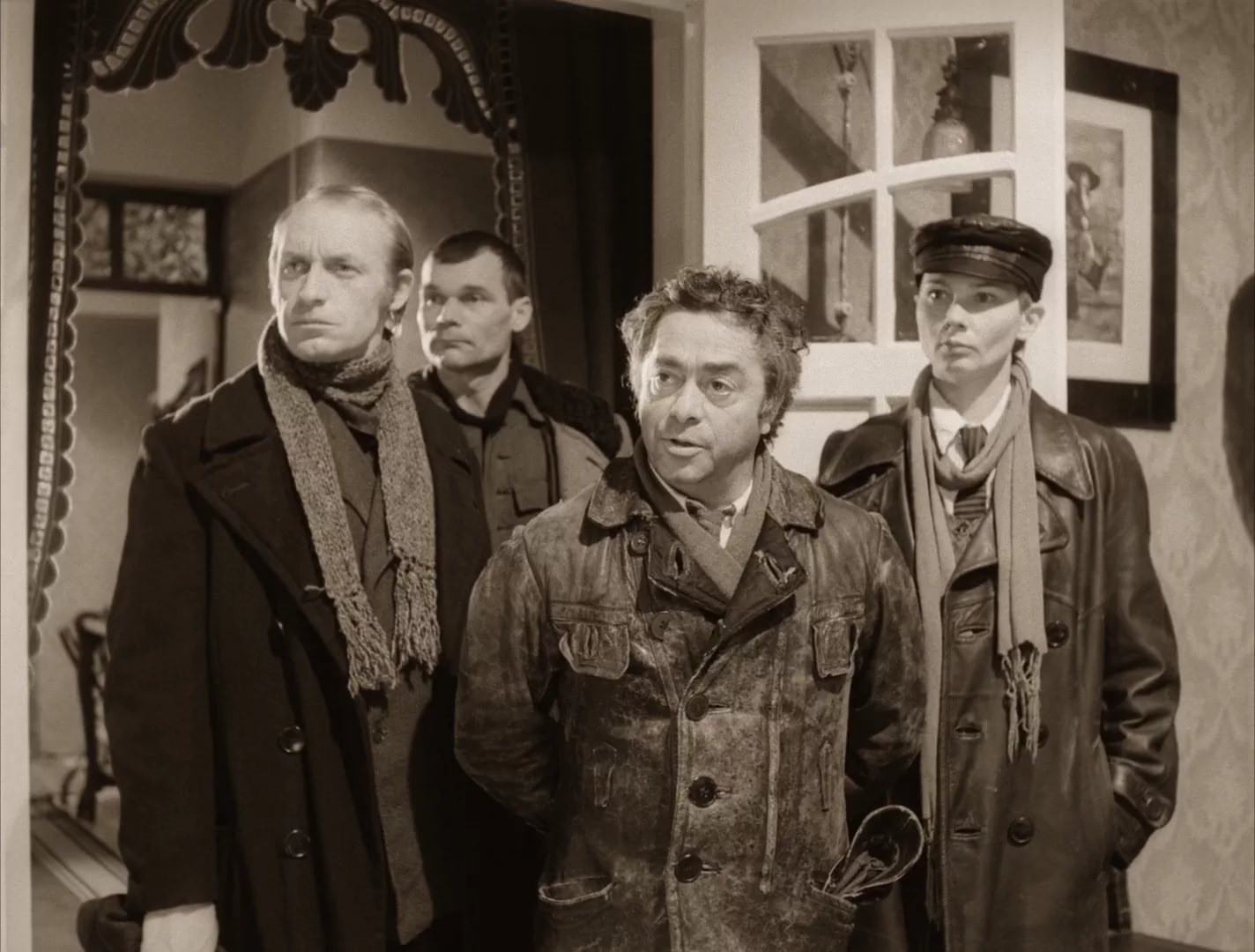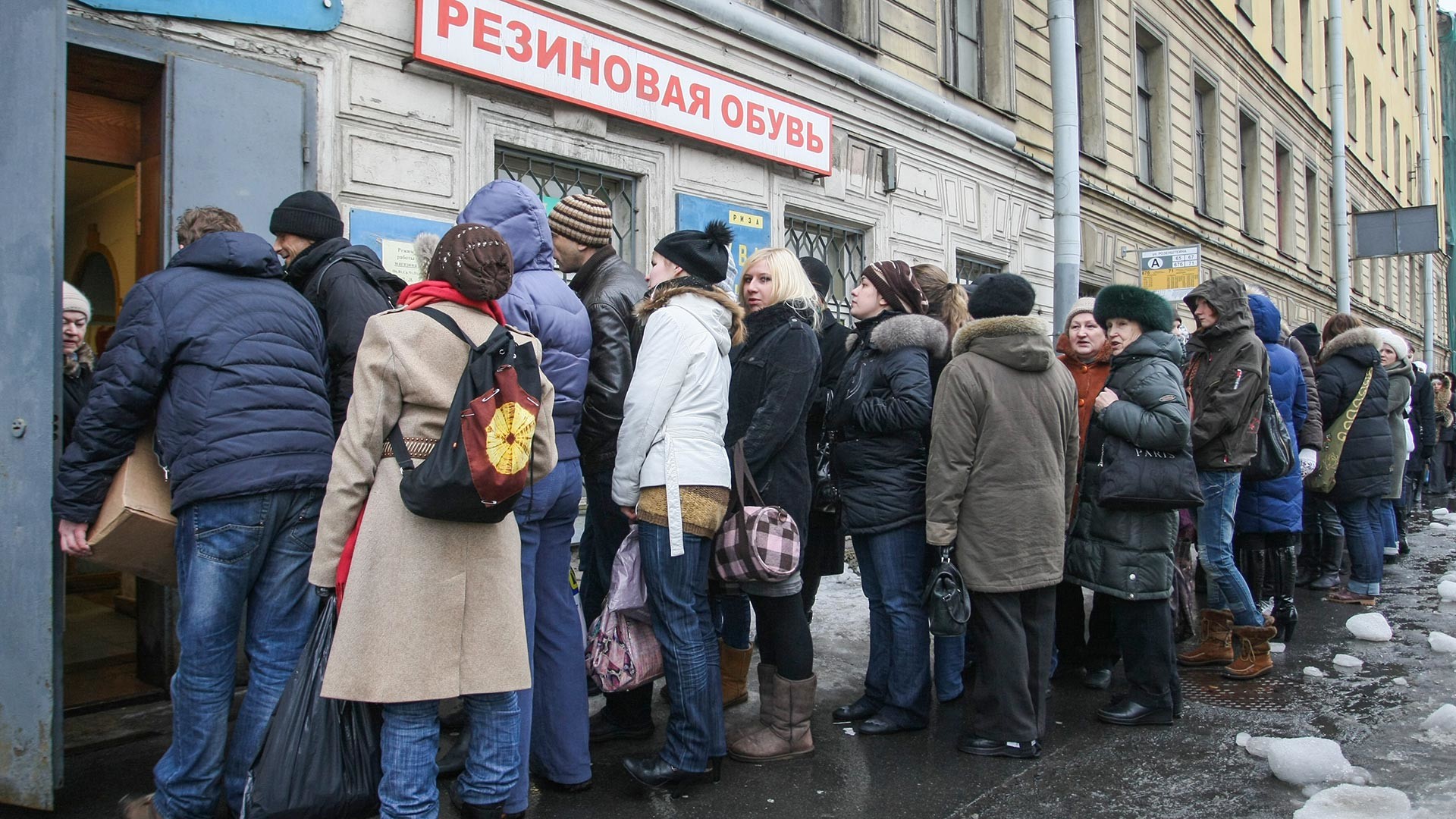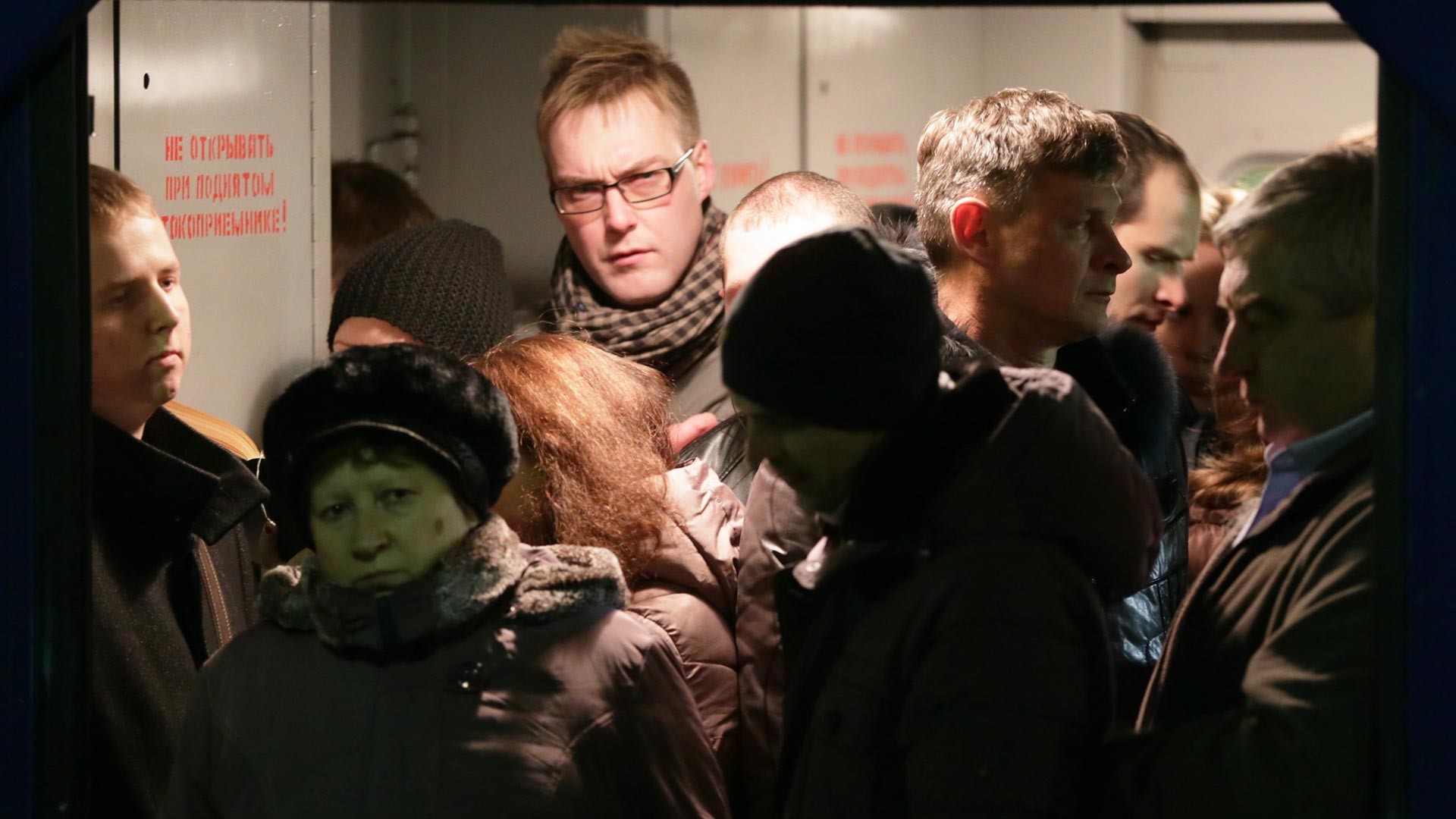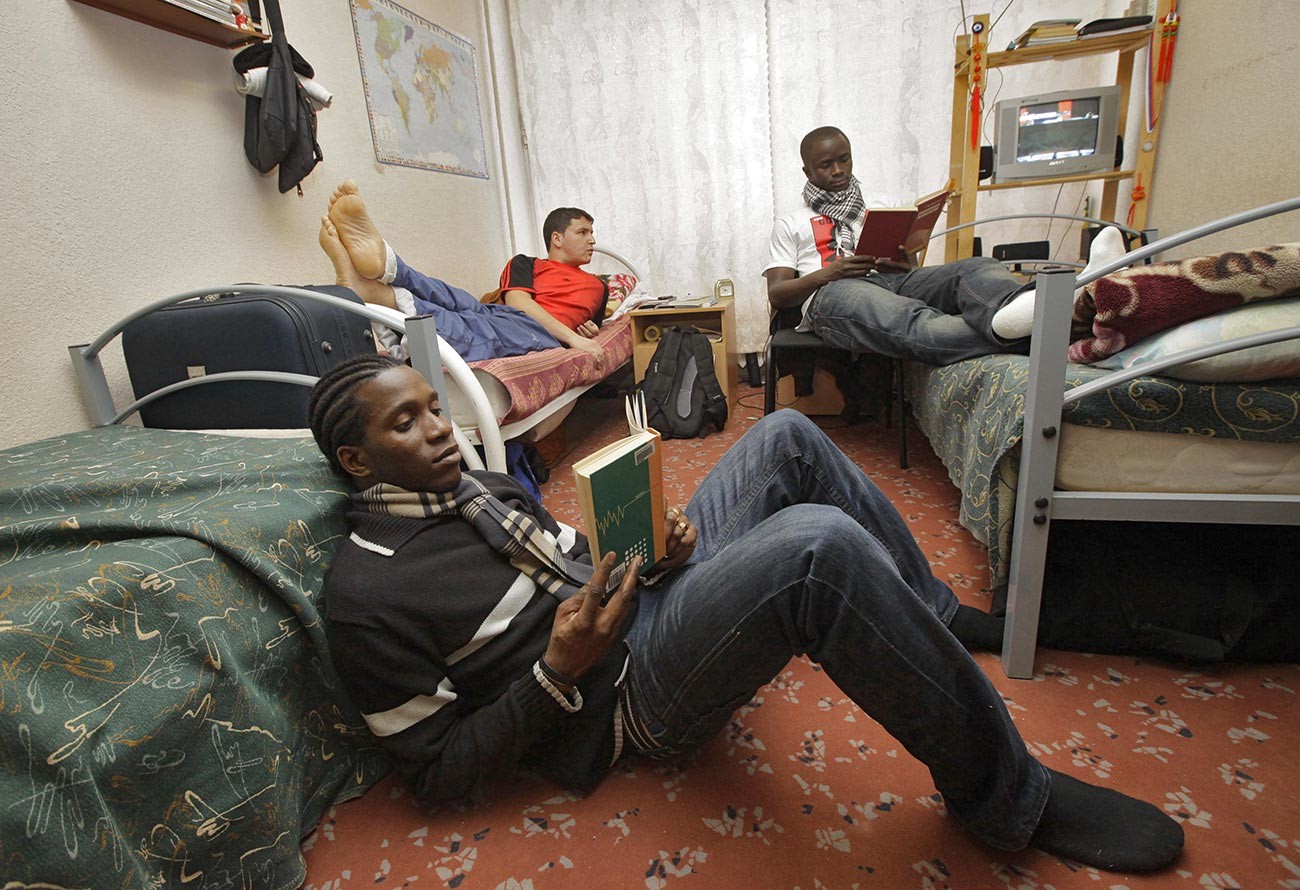« previous post | next post »
Reader and fan Will Thompson wrote to Mark Liberman, who passed his letter on to me, about a recent article by Ellen Barry in The New York Times, discussing a book by the Russian political analyst Nikolai V. Zlobin in which he explains weird/different American cultural norms to Russians.
Will notes that towards the end, the reviewer states:
He [Zlobin] devotes many pages to privacy, a word that does not exist in the Russian language[.]
And Will is suspicious of that claim.
I got the assignment because I have a Russian husband, who has himself published some essays about some of the unexpected cultural differences a Russian encounters in America, and we’ve been dividing our time between Moscow and Amherst for the last 15 years. I’ll start by saying that when I read Barry’s article, my first reactions to the differences Zlobin wrote about that she describes were that they all sound just right. I had to laugh about the “standing in line” differences, because I have sometimes had to remind my generally very polite husband not to breathe down the neck of the person currently at the ticket window when he is next in line, but to back up and give them some space. (And he has had to teach me to be a little more aggressive in line in Russia.)
So our topic is whether the word “privacy” exists in Russian. If you ask “Google translate”, you get eleven choices, and given my own moderate knowledge of Russian, none of them looked equivalent to “privacy” in the sense of valuing your privacy, or wanting to know about Facebook’s privacy policies. And when I asked my husband about it, he agreed that there isn’t any Russian word that’s equivalent because indeed, our particular concept of privacy really isn’t part of Russian culture. So Zlobin is right.
What are Google’s 11? Here they are, with Google’s own ‘back translations’:
1. konfidentsialnost’ – confidentiality, privacy, secrecy
2. chastnaja zhizn’ – private life
3. sekretnost’ — secrecy, privacy, privity (?), secretness
4. neprikosnovennost’ chastnoj zhizni – privacy [‘inviolability of private life’]
5. ujedinennost’ – privacy, solitude
6. ujedinenie — privacy, solitude, seclusion, isolation, retreat, retirement
7. prajvesi – privacy, private immunity [a borrowing from English, still rare, I think; my husband hadn’t heard of it]
8. tajna — secret, mystery, secrecy, confidentiality, privacy, Arcanum
9. lichnoe delo – private matter
10. intimnost’ lichnoj zhizni – privacy [lit. intimacy of personal/private life]
11. intimnaja sfera – privacy [lit. intimate sphere]
Maybe number 7, the borrowed word ‘prajvesi’ is our ‘privacy’, but its newness just confirms the fact that there was no Russian word that really corresponded to our ‘privacy’, presumably because there was no such notion in the culture to be expressed.
December 15, 2012 @ 2:05 pm
· Filed by Barbara Partee under Language and culture, Languages, Lost in translation, Words words words
Permalink
Given that for almost all English speakers ‘privacy’ is a normal, everyday concept, it may come as a shock to find that there is no direct translation for this concept in the Russian language.
To English speakers the idea of not being disturbed or having every detail of our lives on display is very simple and natural to understand. However, in Russian, along with various other languages, such as Mongolian and Latvian, there is no word that adequately describes it.
This can, of course, cause various problems for translators. For example, how would you go about translating 
Having said this, when put into Google Translate, there are actually some results for Russian words which supposedly express the English concept of ‘privacy’. There’s уединение uyedineniye, but this word usually comes with the negative connotations of wishing to be isolated from people and society, therefore it would be better translated as ‘solitude’. So, whilst it does convey the idea of ‘privacy’, in that the person is completely separated from society, this word does not encompass the correct meaning of ‘privacy’.
Another word that google translate offers is тайна taina, however this would be better translated as ‘secret’ or ‘mystery’ and is therefore not adequate as a translation for ‘privacy’!
So why is this the case? We usually hear about foreign words that can’t be expressed in English, not the other way round. The most common thought behind why there is no translation for ‘privacy’ is because there is simply no cultural concept of ‘privacy’ in Russia. Throughout the Soviet times there was no such thing as private property, private space, private life, therefore many linguists presume that there is no direct translation for ‘privacy’ as it simply isn’t a part of Russian culture.
18 October 2017 10:36
It often happens in an ordinary queue at the checkout in a store: Despite the pandemic, someone is bound to be breathing straight down your neck or pushing you with their bag. Many people even today are put under pressure within their own families, with their parents or relatives inundating them with questions such as «When’s the wedding?» or «When are the babies coming?». Or they even try to exert influence on the everyday lives of their adult children — from their choice of profession or partner to the tidiness of their flats or their lifestyle.
Born in the USSR
There is a well-known joke in Russia: «Why can’t you have sex on Red Square? Because you will be inundated with advice». A legacy of the «Land of the Soviets» is unsolicited advice [in Russian, the noun «soviet» denotes a local, regional or national council, but it can also mean a «piece of advice»], while a legacy of socialism is that everyone pokes their nose into everyone else’s affairs.
‘Heart of the dog’ novel and movie is exactly about how the low class became the ruling gone
Vladimir Bortko/Lenfilm, 1988
«During Soviet times, the culture of the bulk of the population — i.e. workers and peasants — became dominant. And the characteristic behaviour of these classes became the norm,» explains Natalya Tikhonova, a chief research fellow at the Center for Stratification Studies at the National Research University Higher School of Economics. «For them, a person’s earnings or intra-family relations were not a taboo subject.»
The phenomenon of Soviet communal apartments completely deprived people of the opportunity to get away from other people and to keep their personal lives private. After the Revolution luxurious aristocratic apartments and mansions were «compacted» — each room had a different tenant or even a whole family living in it. It was part of the struggle against social injustice, except that the shower, toilet and kitchen had to be shared with the other tenants.
A common kitchen in a Soviet communal apartment
Oleg Ivanov/TASS
Therefore, when in the 1950s families started to be allocated individual accommodation en masse, everyone was delighted to have a separate flat, albeit small and modest.
Also, there was a citizens’ oversight system in the USSR. An unfaithful or heavy-drinking individual, male or female, could easily end up being summoned to a «comrades’ court» at work or be expelled from the Communist Party. Those who didn’t perform well at school or university could be compulsorily put under the supervision of the best students.
As a result of many years of intrusion into people’s private lives, which became effectively non-existent, there was essentially no notion of privacy in Russia. And this state of affairs still persists today.
There is no word in Russian for ‘privacy’
«I won’t miss people breathing down your neck in the pharmacy line, asking why you picked out such expensive medicine. (There is no word in Russian for «privacy»),» American journalist Julia Ioffe wrote when she returned to the U.S. after several years working in Russia.
Moscow metro passengers
Sergei Bobylev/TASS
The dictionaries give the meaning of the English word «privacy» as «being alone and undisturbed: the right to this freedom from intrusion or public attention», in other words the right to avoid intrusive attention from others. According to linguists, the word really doesn’t have an exact equivalent in the Russian language. Depending on the context, it can be translated with the help of terms such as «private», «personal» or «confidential», but these words do not fully reflect all its shades of meaning.
Linguist Tatiana Larina proposes the notion of «avtonomiya lichnosti» [individual autonomy] as an equivalent. In the English language, this right to be alone is an important cultural phenomenon since there is even a saying «my home is my castle». But in Russian culture this notion is not widespread because frequently it is only lawyers who know about the inviolability of private life in Russia.
Disrespect for personal space
In spite of the pandemic, many people in Russia fail to observe social distancing. This happens very frequently in queues where people of the older generation squeeze up against those standing in front of them until they are almost touching.
A line for rubber boots
Vadim Zhernov/TASS
«Recently I even asked a woman to keep her distance, but you should have seen what she snorted angrily at me in response,» says Elena, an accountant from Moscow. «Many people think — it seems to be a legacy of Soviet times — that if you stand more than a meter behind the person in front of you, someone is bound to push in and steal your place in the queue. It’s the same on the roads with drivers.»
Another ordeal for people sensitive to privacy is posed by public transport. In any mass transit system in the world in the rush hour there is going to be a crowd of people all squeezed up against one another and all feeling exactly the same way (hemmed in).
In a suburb train
Pavel Smertin/TASS
At the same time, even in these situations it should be possible to observe certain rules of decorum. «I was once sitting in the Metro and a woman standing in front of me kept brushing against me with her large and not particularly clean carrier bag. I asked her to take care with her bag, to which she responded by launching into an angry tirade to the effect that she had nowhere to put her bag, and if I didn’t like it here I should travel in my own car and that I wasn’t the only person here…» says Alexandra, a pensioner from Moscow.
A shock to foreigners
Whereas Russians have by and large got used to having their personal boundaries violated, foreigners in Russia are sometimes genuinely shocked by behavior they find tactless. Lucia from Italy lived in Russia for a number of years and encountered such things on more than one occasion. The woman in charge of monitoring the floor of residence at the Russian State University for the Humanities where she was a student would come into her room without warning or knocking and discover her draped in a towel or wearing her nightwear — and would not be the least bit abashed. «My friends explained that in Soviet times there was no concept of privacy as we understand it nowadays, and her behavior was just part of that mentality,» Lucia says.
Foreign students in a dorm of the Peoples’ Friendship University of Russia
Ruslan Krivobok/Sputnik
Frenchman Erwann has lived in various Russian cities and experienced for himself this same «cultural peculiarity» of Russians so frequently that he has even stopped being surprised. The most striking example happened to him in Nizhny Novgorod. Erwann was a student there for a whole year and rented a flat near the university, and his landlord treated him as a son from the outset… and in a fatherly fashion started coming over without warning early in the morning every Sunday, and could remain chatting for the whole day. According to Erwann, in France people at the very least give prior warning that they are going to drop in, and more often than not arrange meetings in good time.
An inevitable ordeal for foreigners is also posed by personal questions from people they don’t know well. «I don’t know how many times I’ve been asked «Are you married?» within a minute of meeting someone,» Erwann says, laughing. Lucia says she was initially irritated by excessively personal questions from people she did not know well: How much did she earn? Did she plan to marry and have children? But then she also got used to it and stopped being surprised or embarrassed.
«Russians don’t really have a concept or understanding of “boundaries”. It is absolutely common for strangers to start asking you personal questions and offering advice (that they were never asked to provide…). Even when I go to the doctor in Russia, the female doctors will ask if I have children and when I say I don’t, they’ll ask why not,» says Mariya, who is Russian but grew up in America and has lived in a number of different countries. She does not advise people to interpret it as a negative trait or as a lack of manners, however. «I don’t think it should be taken the wrong way. Russians are genuinely curious, open and helpful people so many of them are not consciously trying to invade your privacy or be too nosy or make you uncomfortable. It’s just a national trait, if you will, so I’ve learned to live with it and not let it bother me.»
The fashion for privacy
Still, in a small section of the population, privacy has always existed. Before the 1917 Revolution it was the privilege of the nobility and in Soviet times it existed in the milieu of the educated intelligentsia. For them, there were questions that were inappropriate to ask and there was an idea of personal space.
«[Of late] psychotherapists are frequently approached by people experiencing problems to do with separation from, and the creation of boundaries with, their loved ones,» says psychologist Galina Laysheva from the YouTalk service. «Many people feel that their parents are overly controlling or that they continue to preoccupy them psychologically even when they have moved out of the parental home.»
Also, according to the psychologist, the idea of working through your feelings and developing your emotional intelligence in general is now becoming popular and even fashionable.
If using any of Russia Beyond’s content, partly or in full, always provide an active hyperlink to the original material.
Get the week’s best stories straight to your inbox
…were discussed here or in our sister-city community 
1.
When Russians drink their vodka, they lift their glasses and say «На здоровье».
In fact, «на здоровье» is how you reply to «спасибо» (thank you,) especially if you, say, feed your guests or members of your family and they say «thank you» when they finish their meals. Literally it means «for [your] health,» Russians say it when English speakers say «you’re welcome.»
«На здоровье» is NOT a toast. The poplular Russian toasts closest to it are «будем здоровы» (let’s be healthy) or «за ваше здоровье» (for your health.)
Discussed here, thanks 
2.
There is a Russian proverb that says «In the kingdom of hope, there is no winter».
In fact, there is no such proverb. Russian proverbs are numerous, and some can be really funny or wise, but this one does not exist.
Discussed here, thanks 
3.
Russians have the word «razbliuto» (разблюто,) which means something along the lines of «a feeling a person has for someone he or she once loved but no longer feels the same way about.»
In fact, there is no such word, and not even a hint where the one who made it up has got it
Discussed here, thanks 
4.
Russians have no word for freedom.
In fact, there are at least two words for freedom in Russian — свобода and воля (the adjectives are свободный / F. свободная, N. свободное and вольный / F. вольная, N. вольное.)
Again, thanks 
UPDATE:
5.
Russians call each other «comrade».
In fact, there is no such word in Russian language. It is an English word, which is a nice translation for Russian товарищ. As such, it is widely used in Hollywood movies (with no explanation that this is the translation of the actual Russian word.) And yes, during the Soviet era (approx. 1918-1991) most Russians would use this salutation (товарищ), especially in formal, official settings.
Discussed here, mentioned by 
6.
Russian women wear kerciefs or shawls on their heards, and the word for those shawls is «babushka».
Actually, Russian word бабушка (NOT babushka!) means «granny», «grandma.» It has nothing to do with head-covering kerchiefs which Russian women used to wear hundreds of years ago — in remote villages, until almost recently. The Russian word for a kerchief is платок, for a shawl — шаль. Most of women in Russian cities don’t wear those kerchiefs anymore; the only chance to see it is on very, very old women — grandmas, that is — probably that’s why Americans call those kerchiefs «grannies,» or «babushkas.»
UPD:
the babushkas (accent on the first syllable means the women; on the second, the scarf)
(Psychology Today, May-June, 1992)
In fact, neither of those meanings is true: there is no word «babUshka» meaning «the scarf» in Russian language; «the women» in Russian is «женщины»; бабушка (accent on the first syllable) means «grandma» or «granny,» with the secondary, colloquial meaning «any old woman.»
7.
«У нас нет спиртного»
(we don’t serve alcohol, or, more literally, we have no alcohol; спиртное — a word for alcohol as a type of consumable goods)
can be interpreted as a word-play on «spirits — spiritual»; «we have no alcohol» or «we have nothing spiritual».
Actually, since «spiritual» in Russian is «духовный m. / духовная f. / духовное n.,» this word-play is impossible in Russian (unlike English.)
Discussed here, mentioned by 
Any more myths? 
These examples may contain rude words based on your search.
These examples may contain colloquial words based on your search.
I think the word privacy is losing its value.
Does the word privacy mean anything to you?
Parents often confuse the meaning of the word privacy, which is the reason why they end up doing things that jeopardize their relationship with their child.
Родители часто путают смысл слова «конфиденциальность», поэтому они в конечном итоге делают вещи, которые ставят под угрозу их отношения со своим ребенком.
Other results
or by sending an email to attention of the data controller reporting the words Privacy
Be certain the words Privacy Policy are in the Subject line
The company’s original 2,500-word privacy policy stated that facial recognition helped «organize» users files, letting them group together images of the same individual.
В оригинальном соглашении на 2500 слов было сказано, что распознавание лиц помогает «организовать» файлы пользователей, позволяя группировать снимки с одним и тем же человеком.
Even if you do care, reading through Google Chrome’s 13,500-word privacy white paper, which uses a lot of technical jargon and obfuscates exactly what data the browser is tracking, isn’t helpful either.
Даже если вам все равно, прочитав 13500 слов в Google Chrome конфиденциальность белая бумага, который использует много технических терминов и запутывает, какие именно данные отслеживает браузер, также не помогает.
Google’s 4,000-word privacy policy is a secret history of the internet The New York Times
Тайная история интернета в политике конфиденциальности от Google, состоящей из 4000 слов
The word «privacy» is only a word.
The word ‘privacy‘ doesn’t have a clear definition either and has changed throughout history.
Слово «конфиденциальность» также не имеет четкого определения и изменяется на протяжении всей истории.
We did not use the word «privacy«.
The industry’s key word is privacy.
We did not use the word «privacy«.
The word «privacy» doesn’t even come to mind.
In Greek, there’s no word for privacy.
Unfortunately, the word ‘privacy‘ has no adequate translation into Russian.
К сожалению, слово «privacy» не имеет адекватного перевода на русский язык.
The Russian language does not even have a word for privacy.
Just as a brief illustration, take the word ‘privacy‘ in English.
In other words, privacy rights extend beyond the rights listed in the Constitution.
There is no word in Russian for privacy.
Results: 139. Exact: 3. Elapsed time: 235 ms.
Documents
Corporate solutions
Conjugation
Synonyms
Grammar Check
Help & about
Word index: 1-300, 301-600, 601-900
Expression index: 1-400, 401-800, 801-1200
Phrase index: 1-400, 401-800, 801-1200
I have learned how to jerk off with little or no privacy.
freedom, no privacy, constant surveillance, Secret Service men.
Famous people have no privacy, so how will I go to the planetarium?
I know I should have called, but there was no privacy in the van.
no… if I marry Fitz, I won’t have to testify.
ни… Если я выйду за Фитца, не прийдется давать показания.
However, what health workers cannot resolve by themselves are the side effects of imprisonment coupled with stress in overcrowded prisons, with long periods of detention, confinement conditions where there are bedrooms for more than 10 prisoners even in prisons for convicts with long prison sentences(e.g. Mírov)
Однако медицинские работники не в состоянии самостоятельно устранить побочные эффекты тюремного заключения, которые усугубляются стрессовой ситуацией в переполненных тюрьмах, продолжительными сроками задержания, условиями заключения, когда даже в тюрьмах для лиц, осужденных на длительные сроки тюремного заключения( например, в тюрьме Мирова), более десяти заключенных спят в одной камере,
От этих реалити-шоу действительно ничего не скроешь.
There’s no privacy,
no
support,
no
one you can trust.
I have no privacy, and they glare at me with their lifeless eyes.
Я лишен личного пространства, а они пялятся на меня своими безжизненными глазами.
All visits were strictly supervised and the
mother and daughter were allowed no privacy.
Все посещения проводились строго в присутствии персонала,
и матери с дочерью не давали оставаться наедине.
ANON is set in a near-future world where there is no privacy, ignorance or anonymity.
Действие« Анона» происходит в недалеком будущем, в мире, где нет частной жизни, анонимности,
Thing is it’s
so hard to talk at work because there’s no privacy.
Дело в том,
что на работе очень тяжело разговаривать, потому что тут негде уединиться.
The application contains
no
virus, no privacy data collecting,
no
auto install and unable to uninstall problems.
Приложение
не
содержит вирусов, не собирает данные о конфиденциальности,
не
устанавливает автоматическую установку и
не
может удалить проблемы.
As long as the neighborhood vandal keeps my neighbors on edge, I will have no privacy.
Пока районный вандал держит моих соседей начеку, уединение мне не светит.
The SPT found that the
overwhelming majority of patients had little or no privacy, and
no
place to keep their personal effects.
Члены Подкомитета убедились в том,
что у подавляющего большинства пациентов
нет
или практически нет возможностей уединения и у них
нет
места хранить свои личные вещи.
There are
no
advertisements,
no
quality issues,
no
hidden fees,
no
sales pitches,
no
contracts,
purchases required, no privacy issues,
no
restrictions and
no
surprises.
Нет
никакой
рекламы,
никаких
проблем
с
качеством,
никаких
скрытых платежей,
никаких
реклам товара,
никаких
контрактов,
никаких
необходимых покупок,
There is also a high risk of violence in collective centres,
due to the fact that they are over-populated and there is no privacy.
Вероятность подвергнуться насилию в центрах коллективного содержания весьма высока
также по причине перенаселенности и отсутствия пространства для частной жизни.
Results: 608,
Time: 0.0273
English
—
Russian
Russian
—
English
How would you translate privacy into Russian?
May I have some privacy?
I care about my privacy.
asked Jun 15, 2012 at 20:53
1
I think we have a case of a concept not really present in the Russian linguistic world image. One can speculate if the privacy has not really been valued until recently, but that’s beyond the point.
- Конфиденциальность can be used in more formal cases, like in the terms of use of a website, for example. It refers to the information collected about a person (think Facebook).
- Частная жизнь (as in неприкосновенность частной жизни) is again a law-term, usually referring to the actual physical privacy.
- For colloquial usage, what @Dima suggests is probably the best solution.
answered Jun 15, 2012 at 21:29
HelgiHelgi
1,2438 silver badges14 bronze badges
AFIK, there is no good translation. Lately, I have been encountering the word приватность, but I don’t think it is standard.
If you have to translate it, you have to reword it taking the context into account. For example, you might translate Can you give us some privacy? as Не могли бы вы оставить нас одних? Or you might translate I value my privacy. as Я не люблю когда лезут в мои дела.
answered Jun 15, 2012 at 21:24
DimaDima
3,1161 gold badge13 silver badges20 bronze badges
I would guess:
- конфиденциальность
- частная жизнь
- неприкосновенность частной жизни
- секретность
- уединенность, уединение
- тайна
- личное дело
- интимная сторона личной жизни
- интимная сфера
- прайвеси
answered Jun 15, 2012 at 21:30
4
One of the best matches is word покой, although «оставьте меня в покое» means rather ‘leave me alone’ than ‘can I have some privаcy’. The examples suggested for translation would become:
Не могли бы Вы оставить меня в покое?
Мне небезразличен мой покой.
answered Feb 23, 2013 at 15:21
ManjusriManjusri
4,46015 silver badges24 bronze badges
In the sphere of IT the direct imporation of this word is also used:
Приватность в интернете
Настройки приватности
answered Jun 25, 2014 at 12:24
v010dyav010dya
8308 silver badges20 bronze badges
Additionally, you should read this article:
- https://ru.wikipedia.org/wiki/Персональные_данные
How would you translate privacy into Russian?
«Приватность». The IT sphere is the first in line of borrowing of words from another languages.
answered Jun 25, 2014 at 13:00






